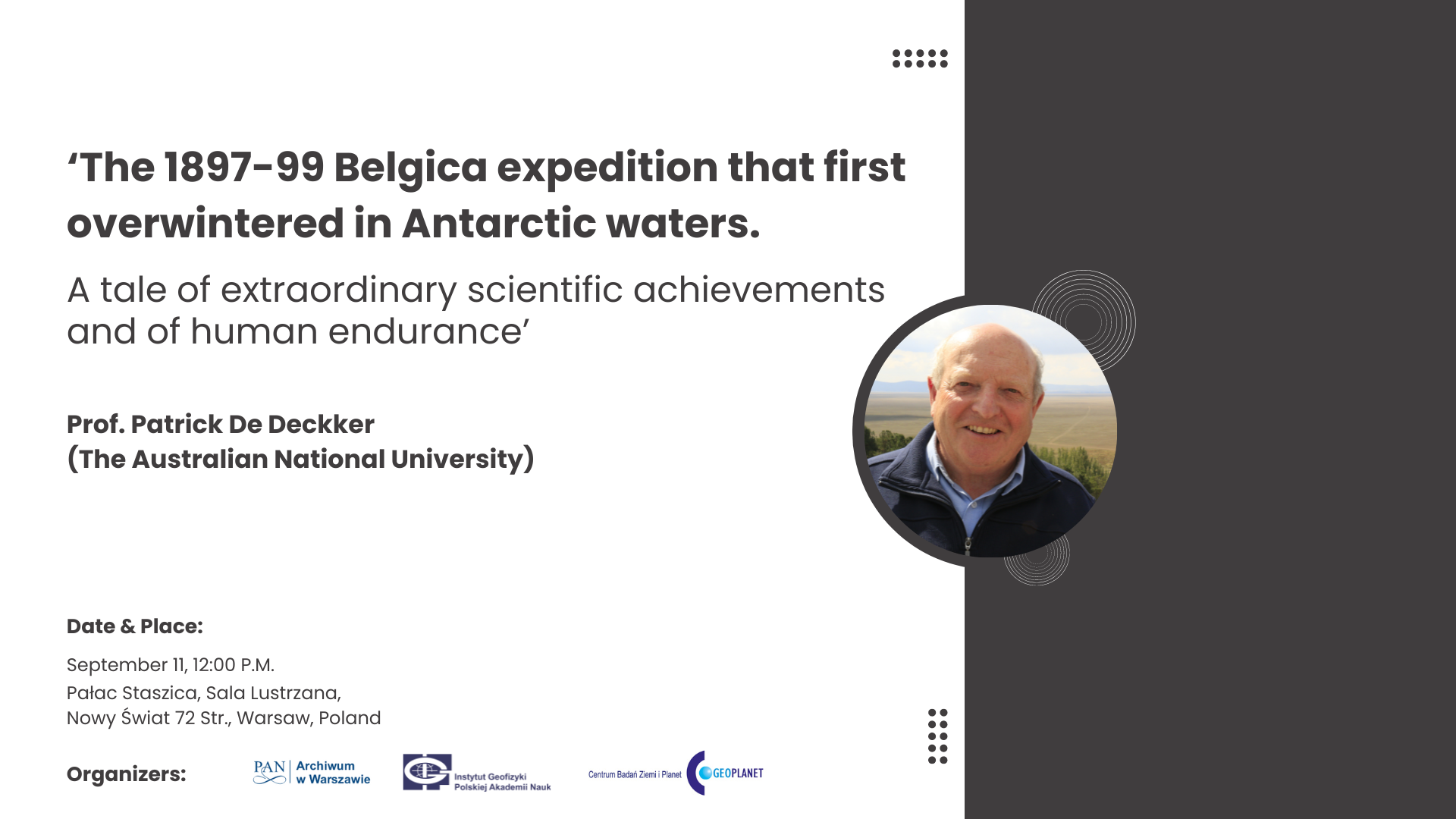We cordially invited to a lecture which will be given by Prof. Patrick De Deckker from The Australian National University on September 11, 12:00 pm at Staszic Palace, Hall of Mirrors (Sala Lustrzana), 72 Nowy Świat St., Warsaw.
The meeting and lecture “The 1897-99 Belgica expedition that first overwintered in Antarctic waters. A tale of extraordinary scientific achievements and of human endurance”, will be held in English.
The event organizers are: Polish Academy of Sciences Archives in Warsaw, Institute of Geophysics of the Polish Academy of Sciences and GeoPlanet – Center for Earth and Planetary Research.
Lecture abstract:
Some 120 years ago Belgium funded an international expedition that eventually departed Antwerp in August 1897. At that time, it was still unknown as to whether Antarctica was a continent and the location of the south magnetic pole was unchartered. The original aim of the Belgica expedition was to overwinter at Cape Adare in Victorialand on the edge of Antarctica. But this did not happen; instead, the voyage first led to the chartering of the deep Drake Passage and eventually the discovery of many new islands bordering the Antarctic Peninsula and a new Passageway frequented today by many tourist ships. There, the expeditioners collected a huge amount of scientific data while also mapping most of the islands. Eventually, the vessel continued its voyage westward towards the Bellinghausen Sea where it became trapped in ice for nearly 13 months. The ship drifted in the sea ice for close to 2,000 km. After much duress, the expeditioners, who had lost two companions, successfully returned to Belgium. All the expeditioners gained international fame during the rest of their career.
Prior to reaching Drake Passage, the expedition carried out much scientific investigation in the vicinity of the Beagle Channel at the southern tip of South America, that included geological, glaciological, biological [fauna and flora], anthropological data collecting. Later on, during the expedition, investigations were broadened and included meteorological, oceanographic, geophysical and ice formation studies that were of great importance to science at the time. Many of these investigations continued while the vessel was trapped in sea ice during which time the expeditioners experienced significant illnesses and deprivation, while also fearing drowning from the possible crushing by movements in the sea ice and some large icebergs.
The numerous scientific reports resulting from the expedition have long been ignored but are resurfacing and being used as they are now available on the internet. Some of the oceanographic and meteorological investigations nowadays are a very important baseline since knowledge that the Antarctic Peninsula is one of the places on the globe facing the largest changes and challenges due to global warming.
I will pay particular attention to the two Polish scientists who were onboard [Henryk Arctowski and Antoni Dobrowolski] and illustrate some of their important findings as well as the Romanian biologist Emil Racovitza.
The Belgica expedition was a truly international expedition funded by Belgium from a variety of sources.
Presenter’s short biography:
Patrick De Deckker is a geologist with a doctorate in zoology. He was educated in Belgium, Switzerland and Australia. He commenced working on microcrustaceans (ostracods) and salt lakes, then used the remains of microorganisms to determine environmental change in large lacustrine systems. Using the same approach, he continued his investigations with the aim of identifying changes in all 3 oceans surrounding Australia, ands spent much time investigating the Australian sector of the Southern Ocean. He spent one summer season studying lakes at an Australian Antarctic base. More recently, he studied airborne dust and its composition in the Australian region and examined the possible record of Australian dust in Antarctic ice cores. Patrick has published over 250 articles in peer-reviewed international scientific journals and edited/co-edited 8 books and journal volumes. Patrick is a Fellow of the Australian Academy of Science.
